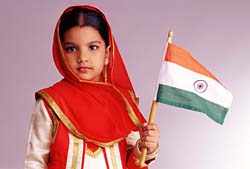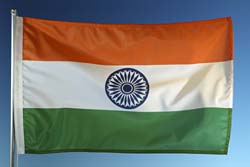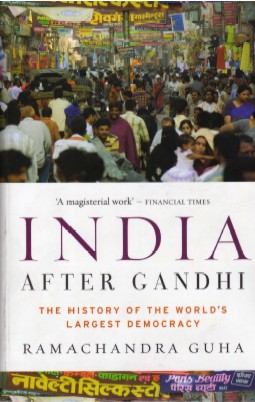

|
“India After Gandhi “– Book Review The First Biography of Independent India: Don’t Miss It! |
|||
(Recently I came to read the book “India after Gandhi” by Ramachandra Guha. In this month where in India’s Independence Day falls, we wish to share with our readers this mammoth, exciting and supremely enlightening account of how India has emerged and evolving as the largest democracy of India.) |
|||
Seldom has it happened that we can read nonfiction in a way that has elements of reading fiction like suspense, statements / dialogues that moves our hearts, narration that brings Tears into eyes and frequently brings surges of patriotic pride if you’re an Indian. All this happened while I raced through aforesaid 898 page-long book (yes, hold your heart; it’s almost 900 pages reading but every page of it a worthwhile journey). I do not believe in a kind of patriotism that gives us false sense of superiority, that makes us belittle other nations and cultures, and that makes people go on war with each other. Having said this, I certainly am proud of being an Indian. |
I feel quite excited being born, living and working in India. I’ve been always overwhelmed by the saga of our freedom- struggle and the heroes who shaped it. But only after I read this book that it dawned upon me how truly fascinating is
the story of India after Independence too, which was no less daunting phase as was struggle for freedom. Reading this remarkably researched work gave me much clearer vision of the uniqueness of experiment called India in the world laboratory. |
I strongly recommend this book to all who are aspiring and working to contribute something for India - do not miss this reading. It will certainly add the zing into your work. Ramachandra Guha says that his whole life has prepared him just to write this book. Everybody who goes through the book (including some 100 plus pages of References!) will agree that it was not a book – indeed it was a life’s mission for Mr. Guha. Thank you, sir, for letting us know what past we belong to and what we’ve inherited.
|
|
|
| |||
About the Author |
|||
RAMACHANDRA GUHA
|
Ramachandra Guha has taught at the University of Oslo, Sanford, Yale and the Institute of Science. His books and essays have been translated into more than twenty languages & his prizes includes the U K cricket society’s Literary |
Award and the Leopard-Hidy Prize of the American Society of Environmental History. To Know more about book & Content Index |
|
|
|||
|
Editorial Reviews | |||
|
From Publishers Weekly India is the country that was never expected to ever be a country. In the late 19th century, Sir John Strachey, a senior British official, grandly opined that the territory's diverse states simply could not possess any sort of unity, physical, political, social or religious. Strachey, clearly, was wrong: India today is a unified entity and a rising global power. Even so, it continues to defy explanation. India's existence, says Guha, an internationally known scholar (Environmentalism: A Global History), has also been an anomaly for academic political science, according to whose axioms cultural heterogeneity and poverty do not make a nation, still less a democratic one. Yet India continues to exist. Guha's aim in this startlingly ambitious political, cultural and social survey is to explain why and how. He cheerfully concludes that India's continuing existence results from its unique diversity and its refusal to be pigeonholed into such conventional political models as Anglo-American liberalism, French republicanism, atheistic communism or Islamist theocracy. India is proudly sui generis, and with August 15, 2007, being the 60th anniversary of Indian independence, Guha's magisterial history of India since that day comes not a moment too soon. |
A stunning work-an instant classic… Well-researched and fact-filler but still eloquent. - San Francisco Chronicle Book Review
“A massive, illustrating, and highly readable volume… Guha is an elegant analyst of why India Succeeds.” - Seattle Times
“Remarkably Comprehensive and yet totally accessible.” - San Jose Mercury News
“Guha’s deeply felt history… succeeds admirably.” - New York Times Book Review
“Huge and absorbing. There will undoubtedly be other books covering the extra ordinary, exhilarating story of post-independence India, but it is hard to imagine... a better one.” - Daily Telegraph (London) |
From The Washington Post A toast to India on its 60th birthday: No country has more heroically pursued the promise of democracy. Against the odds of staggering poverty, linguistic pluralism, regional separatism, caste injustice and natural resource scarcity, Indians have lifted themselves largely by their own sandal straps to become a stalwart democracy and emerging global power. India has risen with epic drama -- a nonviolent struggle for independence followed by mass mayhem and bloodletting, dynastic succession and assassination, military victory and defeat, starvation succeeded by green revolution, political leaders as saints, sinners and sexual ascetics. And yet, the Indian story rarely has been told and is practically unknown to Americans. India After Gandhi masterfully fills the void. India needs a wise and judicious narrator to convey its scale, diversity and chaos -- to describe the whirlwind without getting lost in it. It needs a biographer neither besotted by love nor enraged by disappointment. Ramachandra Guha, a historian has given democratic India the rich, well-paced history it deserves. >>> More - Reviewed by George Perkovich | |
|
| |||
| ||||||||||||||
Team
Alive |
|||
|
|
|
|
| Editor's Note |
|
Happy Independence Day...!
As India's 63rd Independence Day approaches on 15th Aug, we take this opportunity to bring into notice of readers of Alive about the book on history of India after independence. This issue focuses on the book "India After Gandhi" by Ramachandra Guha. Hope this Alive will encourage you to read the book. We welcome feedbacks and opinions by readers. - Team Alive
|
| ||||||||
| Alive Archives | ||||||||
To View Alive Archives, Please Click here>>>
|
|
You
receive this newsletter because you may have registered your name
with us. |
|
© Copy Right by Oasis Self
Leadership Education for Community Development, Vadodara, Gujarat,
India. |











